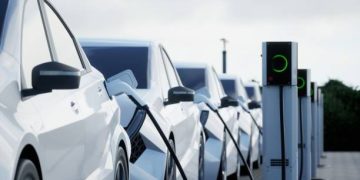The Biden administration has announced a significant increase in tariffs on a variety of Chinese imports, including electric vehicles (EVs), semiconductors, and batteries. This measure is part of a broader effort to protect U.S. jobs and industries. The revised tariffs will also affect products such as aluminum, steel, critical minerals, solar cells, port cranes, and medical products, encompassing $18 billion worth of Chinese goods. Following a comprehensive review of $300 billion in Chinese goods initially subjected to tariffs under the previous administration, the current administration has decided to maintain most of these tariffs. The new adjustments will see the tariff on Chinese EVs rise to 100% this year, with steel and aluminum tariffs roughly tripling.
Semiconductor tariffs are set to double by 2025, and solar cell tariffs will also double to 50% this year. Lael Brainard, the White House National Economic Adviser, emphasized that these tariff adjustments aim to protect the significant job growth spurred by recent legislative measures, such as the Chips Act and the Inflation Reduction Act, from being undermined by unfairly priced imports from China. The administration argues that these measures are necessary to counteract China’s ongoing strategy of bolstering its economic growth through aggressive export practices and investments, even in sectors with existing global overcapacity. Additionally, tariffs on Chinese lithium-ion EV batteries will increase to 25% this year, with a similar adjustment planned for non-EV lithium-ion batteries starting in 2026.
This staggered approach is intended to give U.S. companies additional time to advance their technological capabilities. In response to suggestions that these tariff increases may be politically motivated, senior U.S. officials have clarified that the decisions are unrelated to the upcoming presidential election. Instead, they assert that the targeted sectors are central to the administration’s economic development strategy. These tariff adjustments have provoked reactions from Beijing, with a spokesperson from the Chinese foreign ministry stating that China opposes unilateral tariff increases that violate World Trade Organization rules and has vowed to take all necessary measures to defend its interests. The changes come at a time when other regions, such as the European Union, are also scrutinizing and potentially increasing tariffs on Chinese EV imports, reflecting a broader global reassessment of trade relations with China.
Get comprehensive supply chain report news updates at The Supply Chain Report. For international trade tools, see ADAMftd.com.
#USTradePolicyNews #TariffsIncrease #BidenAdministrationNews #InternationalRelations #SupplyChainImpactNews













